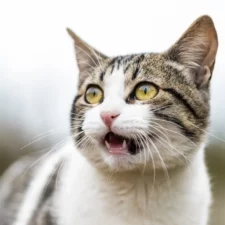The holiday season is a wonderful time filled with joy and cheer, but it’s important to remember that it can present some potential dangers for our beloved pets. While we decorate our homes and savor seasonal goodies, it’s crucial to remain vigilant about common holiday hazards that could harm our furry friends.
Read on as a local vet offers up some tips on how to keep your pets safe during the holiday season.
Toxic Holiday Plants
Many of us adorn our homes with festive plants during the holidays, but some of these can be harmful to pets. Mistletoe, holly, and poinsettias are examples of plants that can cause tummy troubles or more serious reactions if our pets decide to munch on them.
Electrical Cords
The twinkling lights and beautiful ornaments that deck our halls can make our homes look enchanting, but electrical cords can pose a real danger to pets who like to nibble on things. Chewing on cords can lead to electric shocks or burns, which makes them a big risk during this jolly season.
Holiday Treats
Partaking in yummy seasonal treats is a holiday tradition, but many of these foods can be harmful to our furry companions. Chocolate, often found in holiday desserts, is a clear example, as it contains substances that are toxic to pets.
Alcohol and Holiday Foods
As we celebrate with our loved ones, it’s crucial to keep an eye on our pets to ensure they don’t sneak any alcohol or gobble up foods that can be harmful to them. Alcohol can cause serious health issues for pets, and certain foods, like bones and fat trimmings, can lead to tummy troubles.
Open Flames and Candles
Candles add a cozy touch to holiday celebrations, but they also present a fire hazard for pets. Inquisitive animals could accidentally knock over candles, leading to burns or even a house fire. Making sure pets are supervised around open flames is really important for their safety during the festive season.
Things to Keep in Mind
While we’re immersed in the holiday festivities, it’s crucial to keep our furry pals safe. By being aware of common holiday hazards for pets, we can take steps to prevent accidents and create a happy and secure environment for both humans and animals.
Our Advice on Common Holiday Hazards for Pets in 2024
What are the specific symptoms that a pet may exhibit if they have ingested a toxic holiday plant?
If a pet ingests a toxic holiday plant like mistletoe, holly, or poinsettias, they may display symptoms including vomiting, diarrhea, drooling, and lethargy. More severe reactions can include difficulty breathing, a sudden drop in blood pressure, seizures, and even death. It’s vital to monitor any pet that has been around these plants and to seek immediate veterinary care if these symptoms occur, as prompt treatment can be crucial to their recovery.
How can pet owners effectively pet-proof their electrical cords and prevent their animals from chewing on them?
To effectively pet-proof electrical cords and prevent animals from chewing on them, pet owners should consider using cord protectors or covers that encase wires, making them less accessible and less attractive to pets. Additionally, routing cords through furniture or behind appliances where pets cannot reach them is beneficial. Spraying cords with a bitter-tasting, pet-safe deterrent can also discourage chewing. Ensuring pets have plenty of appropriate chew toys can redirect their chewing behavior away from hazardous objects like electrical cords. Regularly checking the condition of cords for any signs of wear or tampering is crucial for maintaining a safe environment.
What are some common holiday foods, besides chocolate, that are toxic to pets?
Common holiday foods that are toxic to pets include grapes and raisins, which can cause kidney failure; onions and garlic, which can lead to anemia; and xylitol, a sweetener found in many sugar-free candies and baked goods, which can cause liver failure and hypoglycemia. Macadamia nuts are also harmful as they can induce weakness, vomiting, hyperthermia, and tremors in dogs. Additionally, fatty foods such as turkey skin and gravy can trigger pancreatitis, a serious inflammatory condition. Pet owners should ensure these foods are kept out of reach during celebrations.
Are there any specific breeds or age groups of pets that are more susceptible to the harmful effects of alcohol or toxic holiday foods?
Yes, certain breeds and age groups of pets are more susceptible to the harmful effects of alcohol and toxic holiday foods. Younger pets, particularly puppies and kittens, are at higher risk due to their smaller body sizes and underdeveloped organ systems, which can make them less capable of processing toxins effectively. Breeds with pre-existing health conditions, such as liver or kidney disease, are also more vulnerable. Brachycephalic breeds, like Bulldogs and Pugs, due to their respiratory issues, may struggle more with complications arising from ingested toxins.
How can pet owners balance their desire to include their pets in holiday celebrations with the need to keep them safe from potential hazards?
Pet owners can balance including their pets in holiday celebrations with safety by implementing a few precautions. First, ensure the environment is free from accessible toxic foods, plants, and decorations. Use pet-safe decorations and avoid tinsel, which can cause intestinal blockages if ingested. Consider creating a pet-friendly space with toys and treats where pets can enjoy the festivities safely. Supervise pets closely during celebrations and consider using gates or crates if needed. Lastly, educate all guests about the rules regarding feeding and interacting with pets to prevent accidents.
And if you have more questions or wish to schedule your furry pal for a wellness checkup, please feel free to call us, your local vet clinic in Powdersville, SC, anytime!








